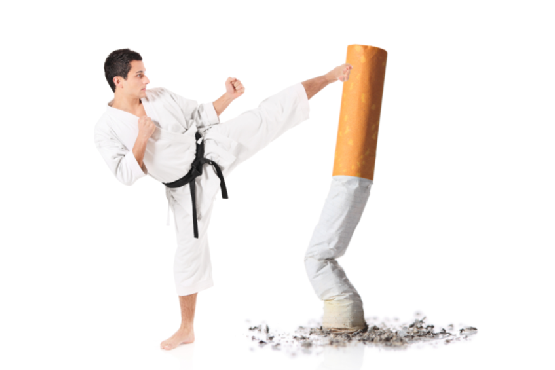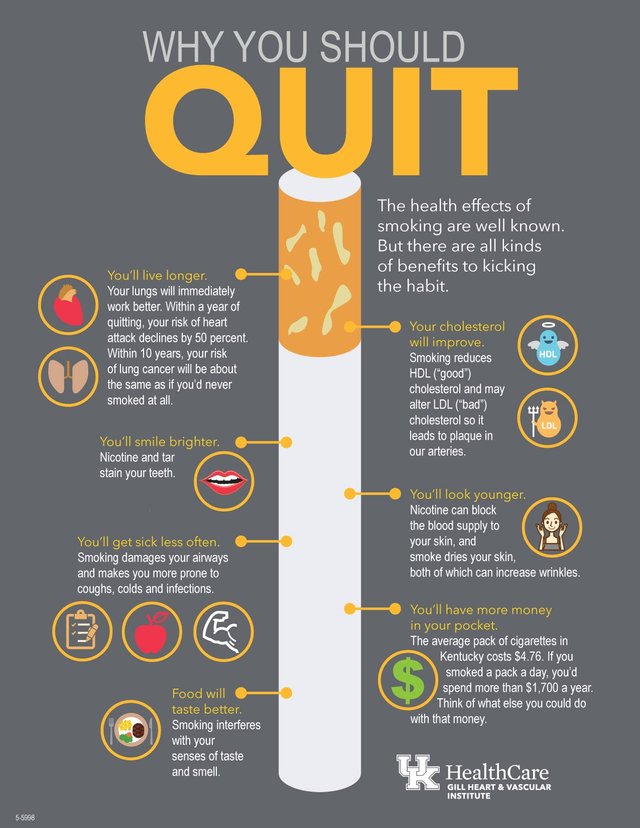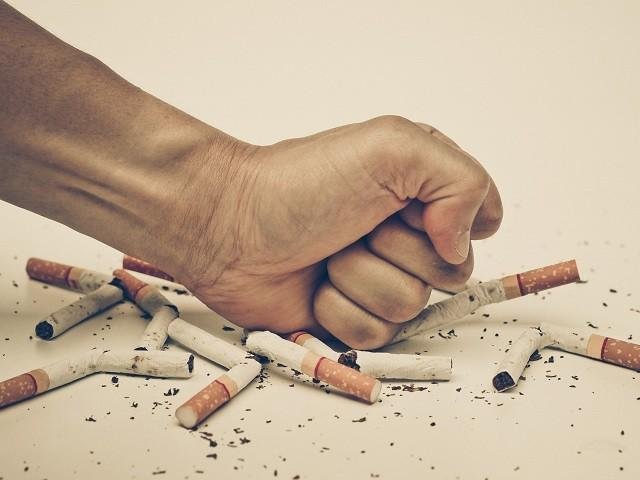Can You Beat the Nicotine?Kicking the Tobacco Habit,12 things you can do!

n 1979, the US public health service called smoking "the largest single preventable cause of illness and premature death in the United States." Tobacco is the only legal product in the US that, when used correctly, kills one out of every four of those who use it. Tobacco is responsible for the death of over 450,000 Americans per year—more than all who die from AIDS, illicit drugs, fires, car crashes, and homicides combined.
Tobacco leads to a variety of painful and terminal illnesses. The greatest number of smoking-related deaths are from heart attack, stroke, and cancer. Two of the more frightening diseases associated with smoking are emphysema and Buerger's disease.
Even if tobacco doesn't kill you outright, some of the non-lethal effects are just as bad. It weakens the bones and is a risk factor for back pain; it causes impotence and premature menopause; it accelerates hair graying, skin wrinkling, loss of vision, and decreased physical capacity. Cancer treatment can be painful and disfiguring; a heart attack or stroke can leave you disabled.
You have a great deal to gain by kicking the habit: longer life, more energy, fewer medical expenses—and the air is fresher, breathing is easier, food is more flavorful and money goes farther. You smell better, and so do the flowers.

It is not an easy task to quit smoking. The 1988 Surgeon General's report revealed that nicotine is six to eight times more addictive than alcohol. Yet since 1964, 44 million Americans have stopped smoking. Most have kicked the habit on their own
An addiction to tobacco is both psychological and physical. Some of the classic withdrawal symptoms are nicotine craving, rapid mood swings, tremors, intestinal problems, headaches, increased smoker's cough (as the lungs clean themselves), sleep disturbances, hunger, anxiety, irritability, restlessness, difficulty concentrating, frustration or anger, dizziness, and nausea. The average person experiences about five of these symptoms during a complete break from cigarettes. The worst of the withdrawal symptoms are usually over within the first 24-72 hours, and all physical symptoms should be completely gone at the end of four weeks.

Choose to quit. The first and most important step is to make a personal choice to stop smoking. Write down your reasons for quitting, keep them with you, and review them frequently. Set a date—the sooner the better—and kick the habit.
Eliminate all cigarettes. Don't plan to fail. Cigarettes close at hand intensify the cravings. Get rid of all temptation.
Plan strategies to resist cravings. A craving lasts only two to three minutes. If you can distract yourself for that long, the battle is yours. Get a drink of water and take several slow deep breaths. Tell someone your reasons for quitting. Find an activity not related to smoking that can be done automatically when necessary.
Exercise daily. Exercise naturally relieves anxiety and tension; it is a powerful mood elevator. When faced with cravings, exercise is an excellent option. Plan some sort of moderate physical activity, such as a brisk walk, into every day. You will have fewer and less intense cravings.
Get more sleep. For the first five days after quitting, your body will require more sleep. Arrange your schedule so that you have the option of an extra two hours in bed if you need it. This will go a long way toward preventing mood swings and tendencies to irritability, frustration, and anger.
Drink 8-12 glasses of water daily. Abundant quantities of water will wash the poisons from your system and prevent dehydration, which seems to make a number of withdrawal symptoms worse. Other beverages are not as effective at keeping you hydrated. Caffeinated drinks are diuretics and promote water loss. Eating just fruit and drinking only fruit juice or water for the first twenty-four hours may help flush your system of toxins.

Shower or bathe more frequently. Water has a tremendous equalizing effect on the nervous system and it keeps your pores clean and open, which helps eliminate toxins through the skin. Also, ridiculous as it may sound, the shower is actually a safe retreat when a nicotine craving hits. Showering and smoking just don't go together for most people.
Avoid substances such as caffeine and alcohol that make it more difficult to quit. Caffeine increases the intensity of some withdrawal symptoms such as nicotine cravings, anxiety, irritability, and difficulty sleeping. It also alters the brain chemistry, making it harder to develop new habits. It is often behaviorally linked with smoking. An unusual reaction occurs when nicotine and caffeine are given up at the same time; their withdrawal symptoms tend to cancel each other out, making it easier to discontinue both. Those who stop smoking but continue to drink coffee have a higher relapse rate than those who stop using both at the same time.
Alcohol interferes with judgment. It will suppress the ability to stick with your decision to quit. Heavy meals, especially in the evening, tend to bring on the urge to smoke. Spicy foods such as mustard, vinegar, ketchup, pickles, pepper, and even cinnamon can increase smoking urges as well as other withdrawal symptoms.Avoid smoking-associated situations. When, where, and with whom do you usually smoke? If you usually smoke sitting at the table after dinner, then get up immediately and do something not associated with smoking. What about that easy chair? Do you always have a cigarette in your hand when you sit there? Sit somewhere else. Explain to your friends what you are doing and ask for their support. If they try to undermine your resolve or tempt you, they are not really your friends; avoid them until you have firmly broken the habit.
Help someone else. Programs that employ a buddy system are invaluable. The act of helping someone else quit provides a tremendous boost of motivation for you to keep going.
Persevere. If, in a moment of weakness, you give in to your cravings, don't give up. Determine to persevere and continue fighting until you win. Figure out what went wrong, devise a plan so it won't happen again, renew your commitment, and obtain the victory. Do not allow yourself to flounder in self-destructive condemnation.
Ask for help. Many people find that their strongest resolutions and most sincere promises are like ropes of sand. They realize that they are slaves to tobacco, incapable of freeing themselves. There is hope for people trying to quit smoking. Your loving Creator will give you strength if you ask Him. Spend some time with Him each day in self-surrender and give this battle to Him. Persevere and He will set you free.